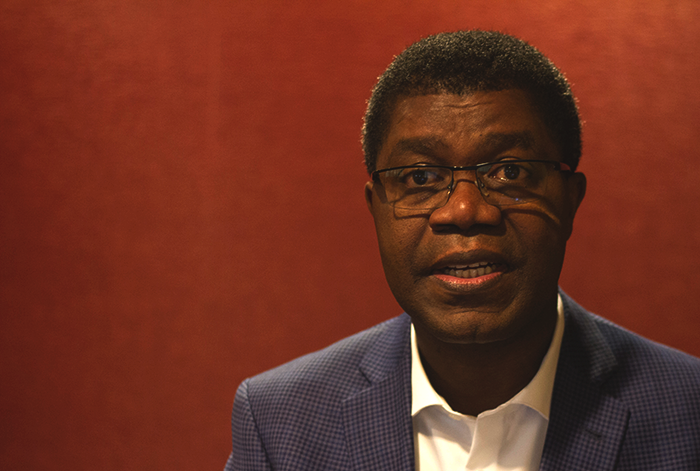By: Anna Valmero
Send to a friend
The details you provide on this page will not be used to send unsolicited email, and will not be sold to a 3rd party. See privacy policy.
Thierry Zomahoun is the president and chief executive officer of the African Institute for Mathematical Sciences (AIMS), and founder and chairman of the Next Einstein Forum (NEF), which helps foster collaboration among young African scientists.
In an effort to raise Africa’s profile in how science and mathematics can address development challenges, Zomahoun is promoting NEF’s scientific programme as a platform to connect science, society and policy.
He believes Africa is in a good position to lead the quantum tech revolution — which relies on computing that is based on quantum mechanics to advance data processing and technological breakthroughs — “by harnessing its scientific talent to define solutions that address problems peculiar to Africa and the developing world”.
Zomahoun talked with SciDev.Net during the 10th World Conference of Science Journalists (October 26-30) in San Francisco, United States.
This interview has been edited for clarity and brevity.
What role can Africa play in the quantum revolution?
I believe that Africa will play a big role. We are working on it and we want to make it possible for Africa to lead this technological revolution. If you look back, we missed the analogue and digital revolution. We are still trying to catch up with the digital revolution.
We want to lead in the quantum revolution because we have the talent, the young Africans — when we take populations from other parts of the world where most people are ageing, this is a disadvantage. [This is] the second thing that made me say Africa will lead the quantum revolution.
The third reason that makes the African continent a good candidate to lead the quantum revolution has to do with political will. Our leaders are determined to provide the legal and policy framework we need to make it possible for researchers worldwide to come to Africa.
How will the quantum revolution benefit Africa, what difference will it make?
The first area that will benefit African researchers is collaboration for research. When Africa starts investing in quantum research and technology development, we will be drawing researchers from Central America to Europe and Asia. This can help build skills, strengthen research infrastructure and add value to the efforts of young African scientists.
Another benefit will [be] the increase of overall data analytical capacity building [in the region]. We have enormous data on the continent, generated since the 1960s. They have not been used yet. Positioning Africa to lead the quantum revolution will imply you have trained people in data analysis and processing data in real time.
The last area in which the continent can benefit is on the policy level. [The] quantum revolution will require another set of regulations and policies. For instance, the banking sector is talking about the confidentiality of customer and client banking data — how do you continue to keep things confidential in the age of the quantum revolution and artificial intelligence?
This change would take three generations, or within 45 years. The benefits can be measured by the small industries that would benefit from it. If you look at what we have achieved in industries we have created, thanks to the digital revolution, you can tell [how quantum revolution will benefit us].
What are the challenges in terms of using the results of scientific breakthroughs from developing regions such as Africa [considering that 1% of global research comes from Africa]
You hear the mention that Africa’s contribution to global research is less than 1%, but let us not forget there is a huge hidden reality in that 1%. Twenty years ago, nobody was talking about research coming out from Africa. We were talking about scientists from Africa who are living and doing research abroad.
If you take the past 12-15 years, Africa’s research has more than tripled—this is something that people are not talking about. Yes, at 1% this [level of contribution] raises concerns. But when you realise that no other region has even tripled its research output in just one decade, it tells you a couple of things — that first, we are not hiding the challenge we are facing; and second, if you see the quality in that 1%, there has been a paradigm shift. If Africa can maintain and quadruple its research output every decade, you can imagine in three to four or five decades from now where we are headed.


